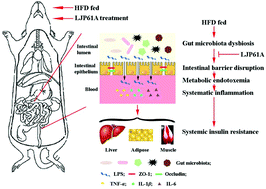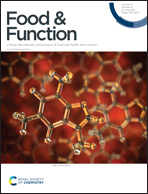Laminaria japonica polysaccharide prevents high-fat-diet-induced insulin resistance in mice via regulating gut microbiota†
Abstract
Insulin resistance has become a worldwide nutrition and metabolic health problem due to the lack of effective protective agents. Laminaria japonica is a well-known marine vegetable. Purified Laminaria japonica polysaccharide (LJP61A) can inhibit atherosclerosis in high-fat-diet (HFD)-fed mice via ameliorating insulin resistance. In this study, we aimed to clarify the mechanism by which LJP61A ameliorates HFD-induced insulin resistance. The results indicated that HFD-induced insulin resistance, obesity, systematic inflammation, metabolic endotoxemia, and gut permeability in mice could be reduced by LJP61A. Gut microbiota analysis showed that the gut microbiota dysbiosis of HFD-fed mice, especially the reduction in mucin-degrading Akkermansia, could be reversed by LJP61A. Additionally, the reduction in mucin-producing goblet cells in HFD-fed mice could also be reversed by LJP61A. Moreover, insulin resistance, obesity, systematic inflammation, metabolic endotoxemia, and gut microbiota dysbiosis in HFD-fed mice could also be alleviated by faecal transplant from LJP61A-treated mice. Overall, LJP61A might be used as a prebiotic to ameliorate HFD-induced insulin resistance and associated metabolic disorders via regulating gut microbiota, especially Akkermansia.



 Please wait while we load your content...
Please wait while we load your content...